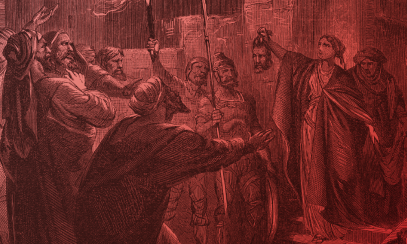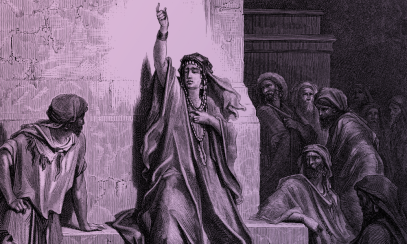
What Will We Be Saying at Mass? Preface Dialogue, Preface and Sanctus
The center and summit of the Mass is the eucharistic prayer, our great prayer of thanksgiving and sanctification. (GIRM 78) Indeed, the Greek word for thanksgiving is eucharistia. The prayer is mainly recited by the priest as, in the name of the entire community, he addresses God the Father, through Christ, in the Holy Spirit. How this prayer begins is evidence of its importance.
Preface Dialogue, Preface and Sanctus
Old words:
Priest: The Lord be with you.
People: And also with you.
Priest: Lift up your hearts.
People: We lift them up to the Lord.
Priest: Let us give thanks to the Lord our God.
People: It is right to give him thanks and praise.
Priest: Father, it is our duty and our salvation always and everywhere to give you thanks through your beloved Son, Jesus Christ. He is the Word through whom you made the universe, the Savior you sent to redeem us. By the power of the Holy Spirit, he took flesh and was born of the Virgin Mary. For our sake he opened his arms on the cross; he put an end to death and revealed the resurrection. In this he fulfilled your will and won for you a holy people. And so we join the angels and the saints in proclaiming your glory as we say:
All: Holy, holy, holy Lord, God of power and might.
Heaven and earth are full of your glory.
Hosanna in the highest.
Blessed is he who comes
in the name of the Lord.
Hosanna in the highest.
New words:
Priest: The Lord be with you.
People: And with your spirit.
Priest: Lift up your hearts.
People: We lift them up to the Lord.
Priest: Let us give thanks to the Lord our God.
People: It is right and just.
Priest: It is truly right and just, our duty and salvation, always and everywhere to give you thanks, Father most holy, through your beloved Son, Jesus Christ, your Word through whom you made all things, whom you sent as our Savior and Redeemer, incarnate by the Holy Spirit and born of the Virgin. Fulfilling your will and gaining for you a holy people, he stretched out his hands as he endured his Passion, so as to break the bonds of death and manifest the resurrection. And so, with the Angels and all the Saints we proclaim your glory, as with one voice we sing (say):
All: Holy, Holy, Holy Lord God of hosts.
Heaven and earth are full of your glory.
Hosanna in the highest.
Blessed is he who comes
in the name of the Lord.
Hosanna in the highest.
The Preface Dialogue
The prayer begins with a dialogue between the people and the priest, who invites us to give thanks to God. “The Lord be with you/And with your spirit” is an exchange already experienced twice during the Mass. Next, the priest invites the people to “Lift up your hearts” (sursum corda) and they respond, “We lift them up to the Lord.”
“Let us give thanks to the Lord our God” can be found in sources dating back to the first Christian communities. Indeed, it is found in nearly all sources except the East Syrian texts. In the new translation, we will respond, “It is right and just.” This is an accurate translation from the Latin. Moreover, it is a natural complement to the line that follows: “It is truly right and just …” The priest reinforces what we have just said as he begins the preface.
The Preface
In the preface (praedicatio – “speaking before”), the priest, “in the name of the entire holy people, glorifies God the Father and gives thanks for the whole work of salvation or for some special part of it that corresponds to the day, festivity or season.” (GIRM 79a) The scholars of Vatican II restored the practice of having a rich variety of prefaces – some are proper to the prayer itself, but most have been composed for a particular liturgical season or day. They highlight a particular reason to be thanking God.
The Sanctus
The Sanctus (“holy”) is one of the oldest congregational hymns of the Mass. It is taken from an ancient synagogue practice and was incorporated into Christian worship as early as the first century. It was not seen everywhere in Western practice until after the fifth century.
The first line of the Holy, Holy, Holy is from Isaiah 6:2-3. In a vision, the prophet sees God on a throne surrounded by his angels. In Hebrew, the term is sabaoth and implies that God has command over an army, or “host,” of angels. It is just one more indication of God’s power over all things. So, in the new translation, we will say “Holy, Holy, Holy, Lord God of hosts.”
“Hosanna in the highest” quotes what the crowds said as Christ entered Jerusalem. (Matt 21:9) “Blessed is he who comes in the name of the Lord” recalls those same crowds who originally were shouting out a verse from Psalm 118:26.
So let us be attentive to every word as we offer God this great prayer of thanksgiving and praise. It is “truly right and just” that we should do so.



